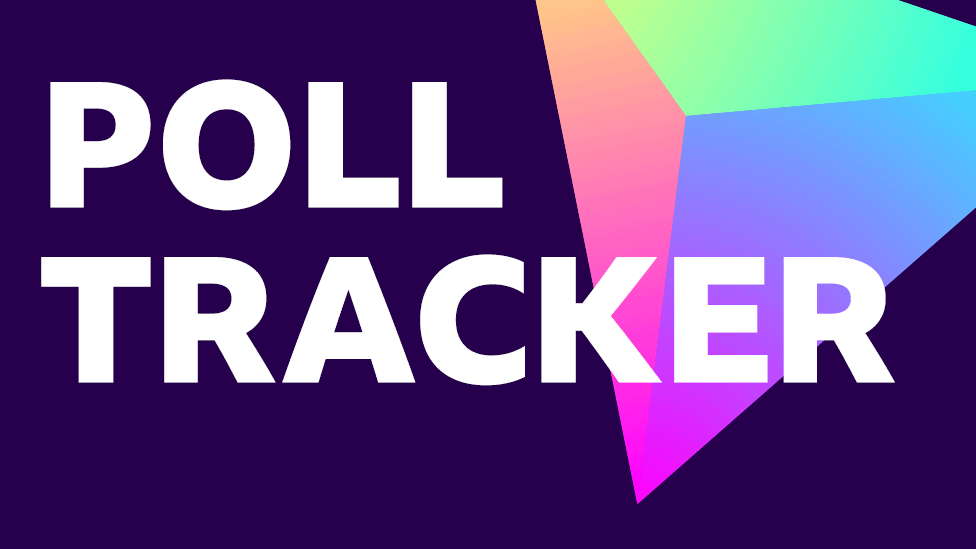How big an issue is Gaza for voters in Bradford?
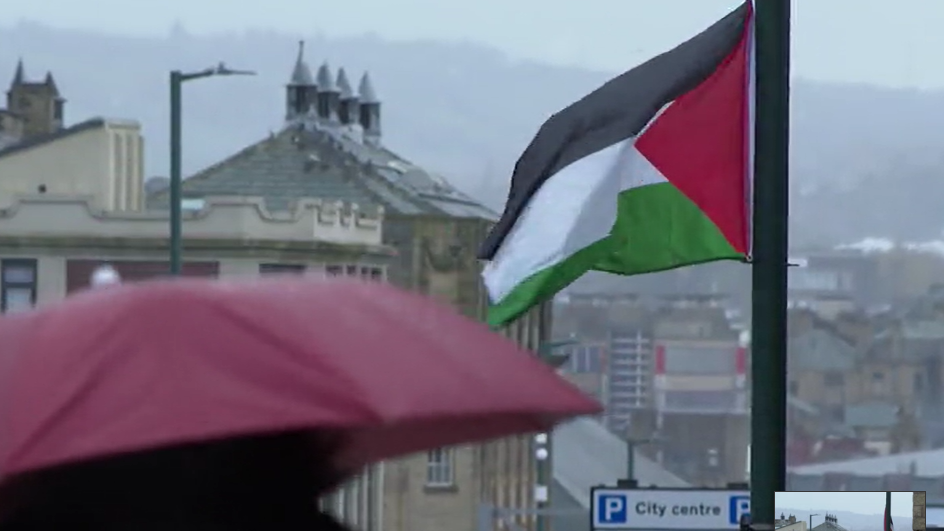
A Palestinian flag flutters outside a business on Leeds Road in Bradford
- Published
The mobile billboard van weaves its way through the streets, the candidate's campaigner blaring out via megaphone that his man has "the loudest voice on Palestine".
A few streets away, on one of Bradford's busiest trade routes for Muslim-owned businesses, that same candidate's face is emblazoned on several giant election banners peppered along the length of the road.
But, despite polls suggesting Labour is very much on the up nationally, the party's name is nowhere to be seen on the displays here - their candidate's message is simply a plea to choose "box number five" come election day.
Gaza matters here and that means it will matter at the ballot box in this area.
Following the Hamas attack on Israel in October, where 1,200 people were killed and more than 250 were kidnapped and taken hostage in Gaza, Israel launched air attacks and then a sustained ground offensive.
That campaign has killed more than 37,900 Palestinians, according to the Hamas-run Gazan health ministry, with tens of thousands injured as Israel pushed first into northern and then southern Gaza.
In Bradford, a city with child poverty running at twice the national rate, the plight of Gaza’s children also weighs heavily on many voters’ minds – especially those of a Muslim background.
For months, they have voiced dissatisfaction with Labour in particular, especially the party's early stance when it called for an "enduring cessation of fighting" instead of a ceasefire.
Although the party has shifted its position, the order that Labour MPs abstain from a Scottish National Party motion calling for a ceasefire was met with fury by some here.
Many Muslim voters say they feel compelled to vote for an unwaveringly pro-ceasefire candidate and party.
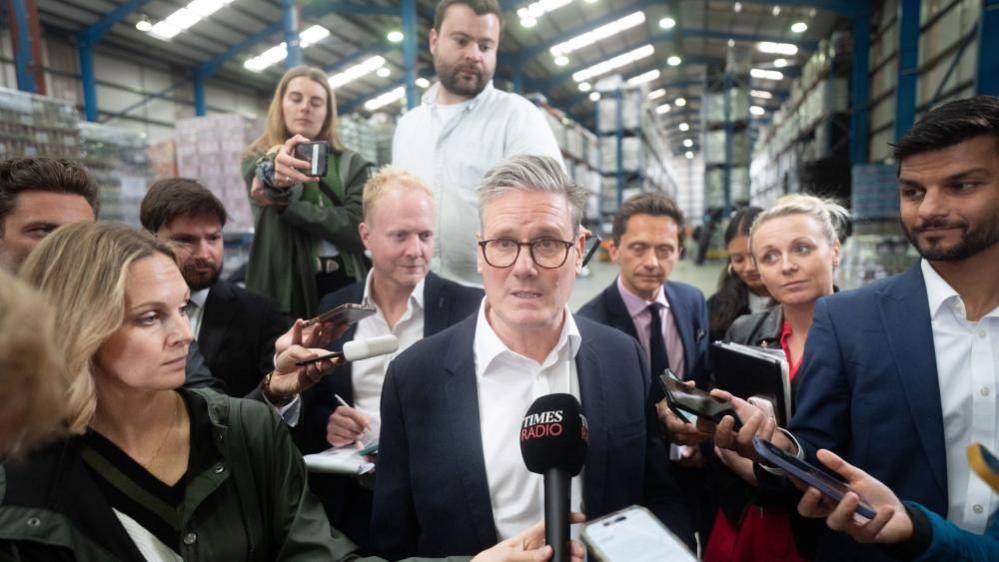
Labour leader Sir Keir Starmer called for a "ceasefire that lasts" in February
That is why in several of Bradford’s five constituencies, global politics could be a crucial factor for the final result.
At a hustings event for Bradford West at the city's university last week, Gaza issues dominated the debate.
Voter Azeem Hussain, who works in further education, told me Gaza will “absolutely” be a factor in which way he votes – if he votes at all.
He did admit it was not the only factor – local services and rising taxes were on his mind, too.
“On a daily basis, the students that I talk to, the families that I talk to, they all agree that it’s a massive factor for us not supporting Labour in particular.
“The Labour vote in the city that I’m from is in massive decline and it was shown in the local elections.”
Labour has already faced a Gaza backlash at May's local elections, with several independents winning on that platform and denting the party’s stronghold at City Hall.
The Bradford West parliamentary constituency, where 58% of the population is Muslim, is particularly unpredictable.
In 2012, George Galloway won here and hailed his victory as the "Bradford Spring".
International politics has always influenced this area.
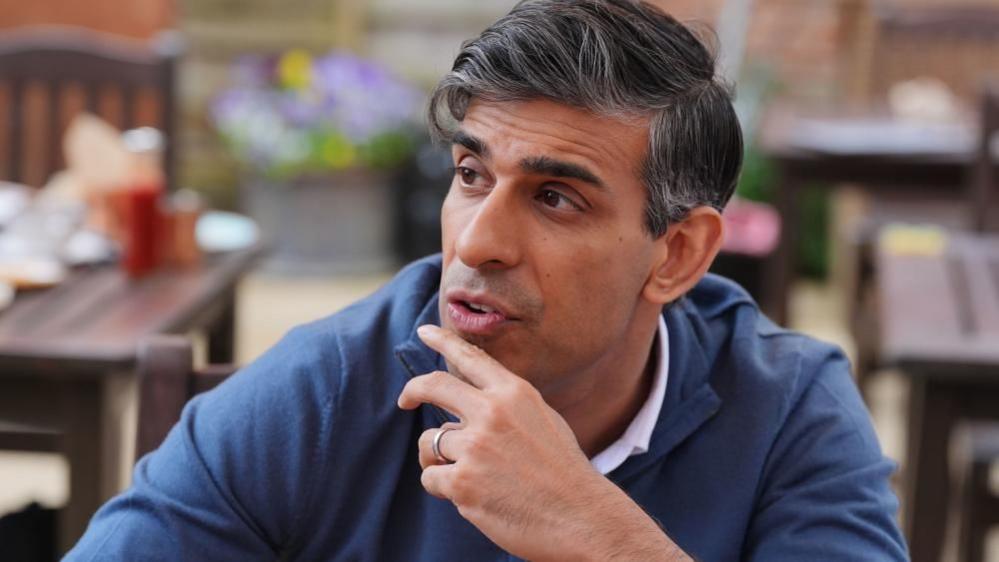
Prime Minister Rishi Sunak has backed a "long-term sustainable ceasefire".
Bradford East can be unpredictable too – and what happens in the Middle East has always been a hot issue here.
Despite Naz Shah and Imran Hussain – latterly the sitting Labour MPs in those two seats - both resigning from the shadow front bench over the Gaza issue last year, both face fresh challenges from pro-ceasefire independents.
For a full list of candidates in Bradford West click here
For a full list of candidates in Bradford East click here
There is a definite sense Labour will rely on its Bradford candidates’ own track records and trust with Muslim voters to shore up the party’s vote and to try and pull them through on 4 July.
It appears that any efforts by the national party may now antagonise a large, core Labour vote.
Campaigns by other parties’ candidates in both these constituencies have also been very low key.
Conservative candidate Aubrey Holt’s six-point plan for Bradford East does not mention international politics at all and focuses very much on local issues.
Nigel Moxon, the Conservative candidate for Bradford West, is a councillor in Nottinghamshire. Listings for his campaign point voters to the Conservatives’ website home page.
Rishi Sunak has repeatedly called for "a humanitarian pause" to allow aid to get into Gaza, and backed a "long-term sustainable ceasefire".
However – despite some disagreement in its ranks - the Conservative government had continued to stand by Israel's right to defend its security, and refused to back calls for a halting of UK arms sales to Israel.
Labour's Sir Keir Starmer has called for "a ceasefire that lasts", and supported the government's stance of calling for Israel to pause its action.
However the feeling here and in similar communities is that neither party has been clear, unequivocal or impartial in its response, and that both have failed to apply enough pressure on Israel.
The anger at Labour is more pronounced in those Muslim communities where it traditionally has a strong and loyal following – and where Jeremy Corbyn is still hugely popular.
That is perhaps why there has been a distinct dearth of visits from any political big- hitters to the urban, more diverse areas of Bradford during this campaign.
Neighbouring Keighley is a bellwether seat which could also be impacted by events in Gaza.
Conservative Robbie Moore won it last time, with Labour's John Grogan in second.
The pair are set to do battle again.
For a full list of candidates in Keighley and Ilkley click here
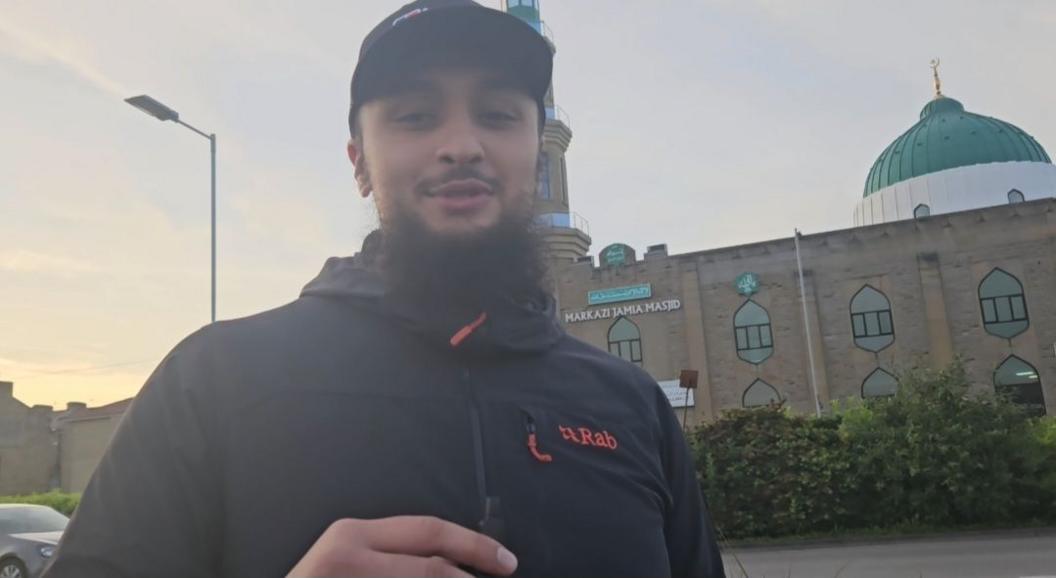
Umar Mehmood says while Gaza won't be the only issue for many Muslims at the ballot box, it will still have an effect
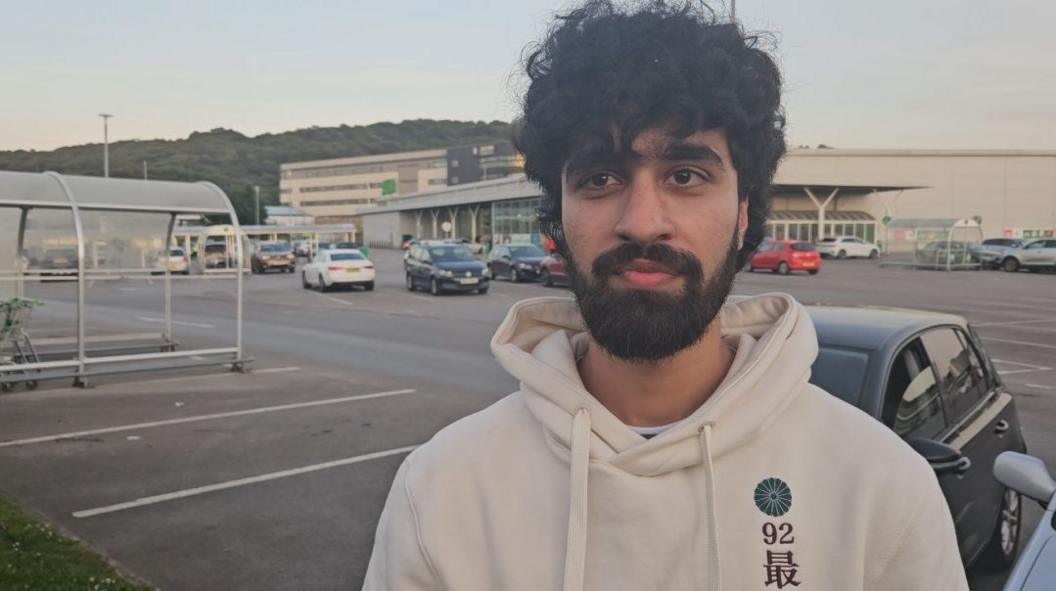
Faizan Ahmed, 21, is a first time voter - but is unsure if he will cast his ballot
On a visit to find out what people think, I approach a group of lads hanging out in a supermarket car park, in the shadow of the town’s biggest mosque.
They are politically engaged when it comes to some issues – but far from enthused by the current general election campaign or the current political offer.
Twenty-year-old Umar Mehmood tells me he thinks there are “good people” standing for election, and also acknowledges the “sticky situation” that has led to this democratic impasse for many in his networks.
“Humans aren't perfect, and regardless of what side it is, two wrongs don't make a right,” he muses.
“It's not going to be the only issue that Muslims are going to vote on, but it is definitely a factor,” he adds of Gaza.
Faizan Ahmed is 21 and a first-time voter, like his friends.
He is not sure yet whether he will vote at all on Thursday.
“Labour has just become the same as Conservatives now, so it doesn't really make a difference,” he says. “But Gaza became the deal-breaker.”
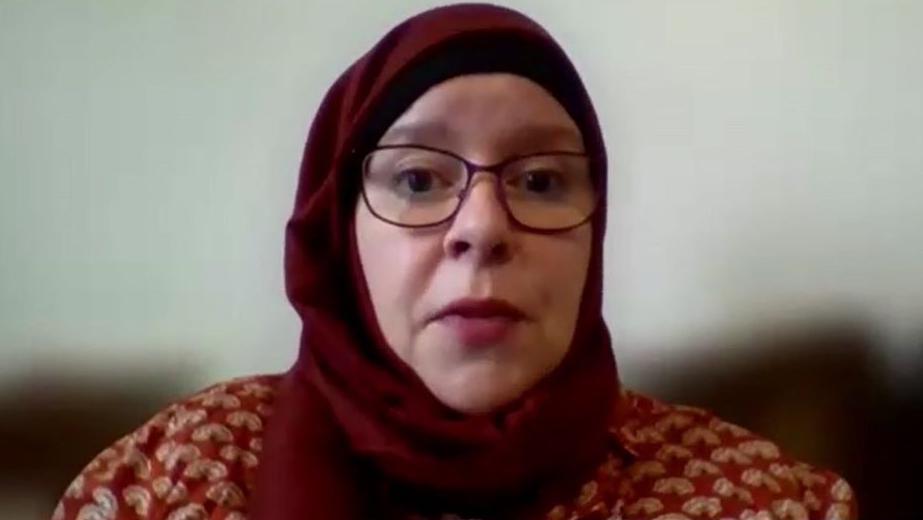
Linsay Taylor, of the Muslim Vote coalition, says Gaza is "at the heart" for many people - but not the only issue they care about
This is a view partly shared by Linsay Taylor, head of community engagement at Muslim advocacy charity MEND, which is part of the national Muslim Vote coalition.
The campaign’s primary focus is to get voter engagement rates up – and to spotlight issues like the 60% of the Muslim community living under the poverty line, and the intersection of things like housing, education, health and welfare with minority and faith identities.
She says Gaza has “really galvanised the community, and that should be respected and understood and honoured”.
But she also stresses, “it is not just the Muslim community that feel passionate about this.
“My job takes me the length and breadth of the country, and I engage with Muslims and non-Muslims. It’s a topic on everybody's lips.
"It's not just an important issue for Muslims, because it's not a religious issue. It's a humanitarian issue."
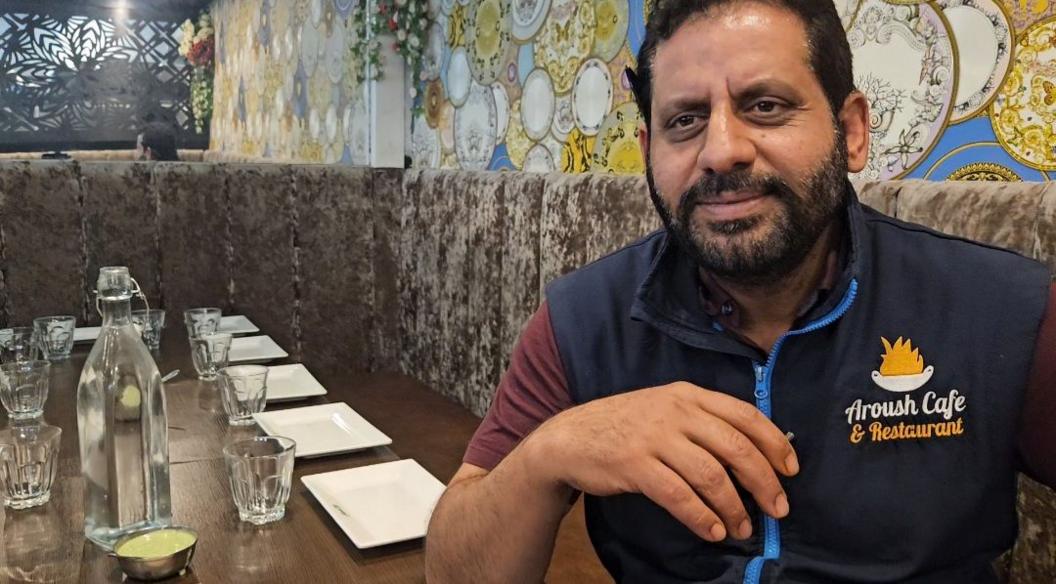
Businessman Habib Hussain says there are many issues to resolve
Over in the centre of town, meanwhile, café owner Habib Hussain is also quite circumspect.
He cares deeply and passionately about the plight of people in Gaza and the wider region, but says “we live in this country and we need to vote for ourselves”.
“First of all, we should think about ourselves and then we can talk about foreign policy,” he says.
“Our main concern in this country is health issues, school problems, our kids, they are out on the streets, they have no jobs, there are lots of other issues.”
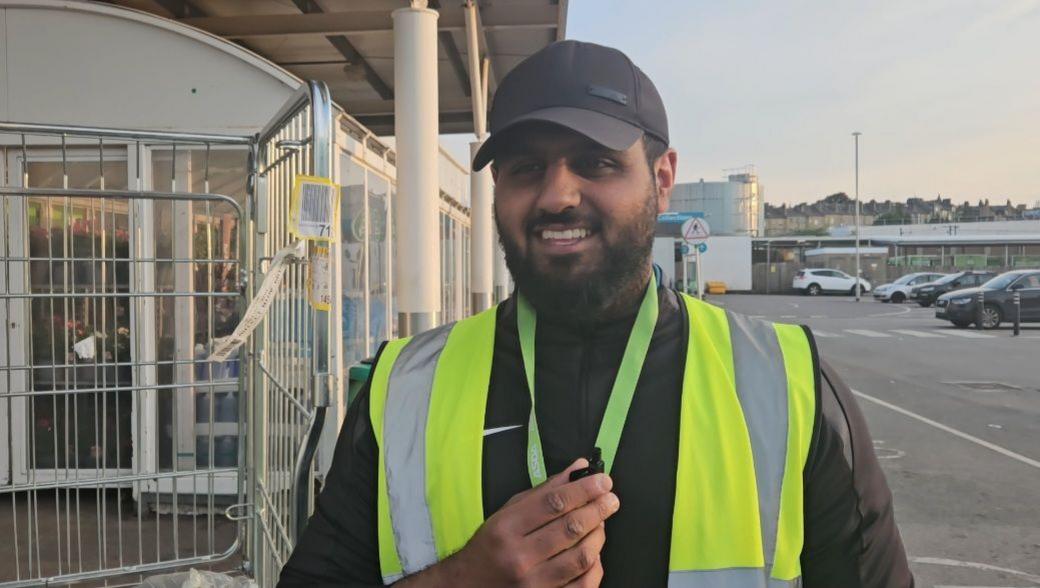
Hassan Farooq says he won't vote for any candidate who "profiteers" from emotions over Gaza at the expense of important local issues
Back in the car park, supermarket worker Hassan Farooq, 22, says he worries that people are forgetting local everyday issues.
“I'm not saying Gaza doesn't matter, because it does. And the Muslim vote does matter.
“But the main political parties, for them, it's a non-issue, it's far away from home and they're not too bothered.
“I don't want people profiteering off it because they're not going to bring about any change.
"No-one cares. If you focus on the local issues, which you can change and you can influence, fair enough, you have my vote.
"But don't try and profiteer off this Gaza issue saying you're the man that's going to bring about change - because you're not.”
Related topics
- Published3 July 2024
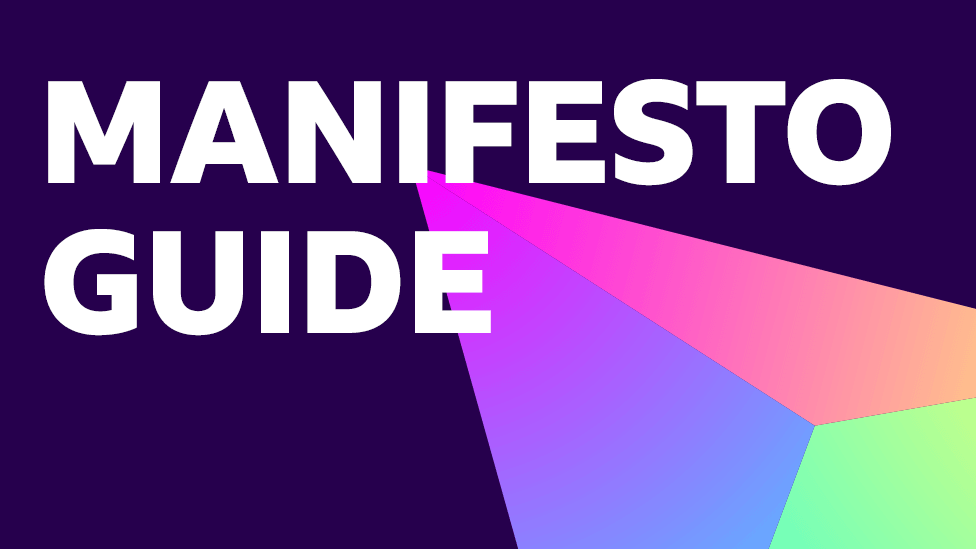
- Published29 April
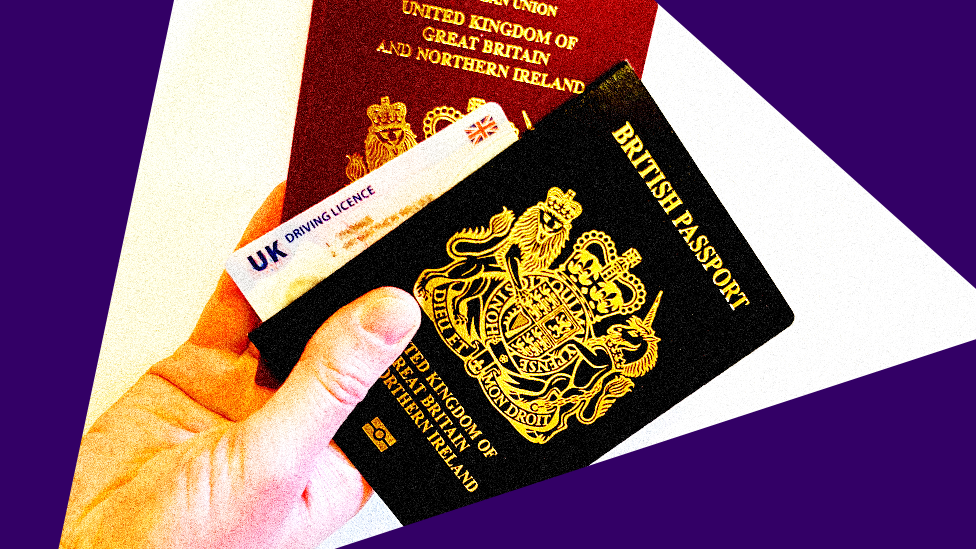
- Published3 July 2024
